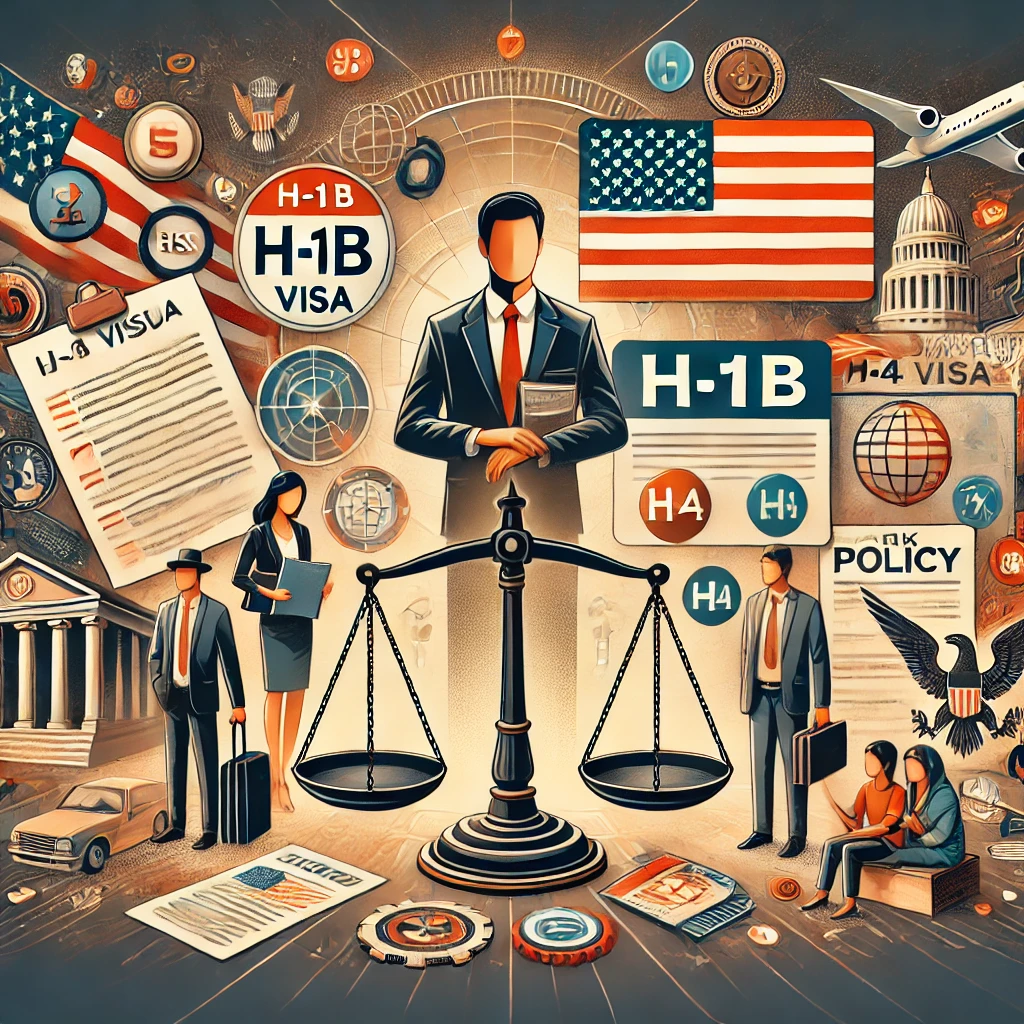The H-1B visa program has long been a cornerstone of the United States’ strategy to attract skilled foreign talent, especially in specialized fields like technology, healthcare, and engineering. Initially designed to fill skill gaps in the U.S. labor market, the program has brought countless professionals from around the world to contribute to American innovation and economic growth. However, recent investigations and reports have raised concerns about the abuse of the H-1B program. This has sparked a renewed debate over its intent, implementation, and broader implications, including the controversial question of whether spouses of H-1B holders should be permitted to work in the United States.
Understanding the H-1B Program
The H-1B visa allows U.S. employers to temporarily employ foreign workers in specialty occupations that require a high level of expertise. These jobs often require advanced degrees and are critical in fields like technology, science, engineering, and healthcare. Every year, the U.S. Citizenship and Immigration Services (USCIS) caps the number of H-1B visas at 85,000, including 20,000 reserved for applicants with advanced degrees from U.S. institutions.
While the program has played a vital role in bolstering the U.S. economy, it has also been criticized for potential misuse by employers and other stakeholders.
How the H-1B Program is Being Abused
- Wage Suppression: One of the most common criticisms of the H-1B program is that some employers use it to suppress wages. By hiring foreign workers who are often willing to work for less than their American counterparts, certain companies can save on labor costs while undercutting U.S. workers.
- Displacement of Domestic Workers: Critics argue that the program, rather than filling genuine skill gaps, is sometimes used to replace American workers with cheaper foreign labor. This displacement undermines the program’s original intent and has fueled widespread resentment.
- Body Shops and Middlemen: “Body shops” or third-party staffing companies have emerged as significant abusers of the H-1B program. These companies hire H-1B workers and lease them to other firms, often under dubious contractual terms. This not only exploits foreign workers but also circumvents labor laws.
- Fraudulent Applications: Reports have highlighted instances where companies submit fraudulent H-1B applications, exaggerating job requirements or offering non-existent positions. This misuse strains the system and prevents genuine applicants from securing visas.
- Exploitation of Workers: Many H-1B workers are tied to their sponsoring employer, leaving them vulnerable to exploitation. Fear of losing their visa status often forces these workers to accept unfair wages and poor working conditions.
Impact of Abuse on the U.S. Labor Market
The misuse of the H-1B program has far-reaching consequences for the U.S. labor market:
- Reduced Opportunities for U.S. Workers: Abuse of the program often leads to the replacement of domestic workers, creating a ripple effect of job insecurity.
- Devaluation of Wages: By allowing companies to hire foreign workers at lower wages, the program inadvertently suppresses the earning potential of American workers.
- Strain on Resources: Fraudulent applications and misuse increase administrative burdens, delaying the processing of genuine applications.
The H-4 Visa Debate: Should Spouses of H-1B Holders Be Allowed to Work?
An often-overlooked aspect of the H-1B program is the H-4 visa, granted to the spouses and dependents of H-1B workers. Traditionally, H-4 visa holders were not permitted to work in the U.S., but this changed in 2015 when the Obama administration introduced a rule allowing certain H-4 visa holders to obtain work authorization, provided the primary H-1B holder was on the path to obtaining a green card.
While the move was seen as a step toward empowering immigrant families and reducing financial burdens, it has also sparked controversy. Let’s explore the key arguments for and against permitting H-4 visa holders to work:
Arguments in Favor of Allowing H-4 Visa Holders to Work
- Economic Contribution: Allowing H-4 visa holders to work can significantly boost household incomes and, by extension, consumer spending. This contributes to the overall economy.
- Addressing Talent Shortages: Many H-4 visa holders are highly skilled individuals with advanced degrees. Preventing them from working means the U.S. loses access to a valuable talent pool.
- Enhancing Family Stability: Work authorization helps H-4 visa holders achieve financial independence and reduces the mental and emotional stress associated with being solely dependent on their spouses.
- Encouraging Global Talent: Offering work authorization makes the U.S. a more attractive destination for highly skilled professionals, helping to maintain its competitive edge globally.
Arguments Against Allowing H-4 Visa Holders to Work
- Competition with U.S. Workers: Critics argue that granting work authorization to H-4 visa holders increases competition in the job market, potentially displacing U.S. workers.
- Immigration Policy Concerns: Opponents believe that expanding work authorization for dependents dilutes the focus of employment-based immigration policies, which are intended to address specific skill gaps.
- Administrative Challenges: Expanding work authorization creates additional administrative burdens for the USCIS, potentially delaying the processing of other visa applications.
- Overburdened Job Market: Some argue that adding more workers to the job market could strain resources, particularly in regions with already high unemployment rates.
Could Policy Changes Provoke Hate Crimes?
Donald Trump’s administration introduced significant changes to the H-1B visa program, tightening eligibility criteria and reducing the number of work authorizations granted. While these policies were framed as measures to protect U.S. workers, they unintentionally stoked tensions and fears, potentially fueling hate crimes. Here’s how:
- Increased Nationalistic Sentiments: The rhetoric surrounding the policy changes often painted H-1B workers as threats to American jobs. This framing reinforced anti-immigrant sentiments and emboldened individuals with xenophobic views.
- Perceived Economic Threat: Restrictive policies created a perception that foreign workers were unfairly competing with U.S. citizens for limited opportunities. This misconception heightened resentment and, in extreme cases, led to targeted hate crimes.
- Political Divisions: The polarizing nature of immigration debates amplified societal divisions. Some individuals used these policy changes as justification for discriminatory behavior.
- Targeting of Communities: Many H-1B workers and their families belong to specific ethnic communities. Hate crimes against these groups increased as immigration became a focal point of political discourse.
Preventive Measures
To mitigate these risks, several steps can be taken:
- Public Awareness Campaigns: Educate the public on the economic contributions of H-1B workers to dispel myths and reduce hostility.
- Anti-Discrimination Policies: Enforce stricter penalties for hate crimes and workplace discrimination.
- Community Engagement: Foster dialogue between immigrant and local communities to build mutual understanding and respect.
Striking a Balance
The debate over H-4 visa work authorization and the potential for hate crimes reflects broader tensions in U.S. immigration policy. Striking the right balance requires:
- Improved Oversight: Strengthening oversight of the H-1B program to prevent abuse and ensure it fulfills its intended purpose.
- Targeted Authorization: Limiting work authorization for H-4 visa holders to sectors experiencing significant skill shortages.
- Comprehensive Immigration Reform: Addressing systemic issues in the immigration system to create fairer, more efficient policies.
The H-1B visa program has undoubtedly contributed to the U.S. economy and global competitiveness, but its abuse undermines its credibility and effectiveness. Addressing these issues requires robust reforms to protect both American and foreign workers. Similarly, the debate over H-4 visa work authorization highlights the need for a balanced approach that considers economic benefits and potential drawbacks.
At the same time, the unintended social consequences of immigration policy changes, such as the rise in hate crimes, underline the importance of responsible political rhetoric and public education. As the U.S. navigates its future immigration policies, it must strive to create a system that upholds fairness, fosters innovation, and ensures economic stability. Only then can programs like the H-1B and H-4 achieve their true potential while maintaining the trust and support of the American people.

